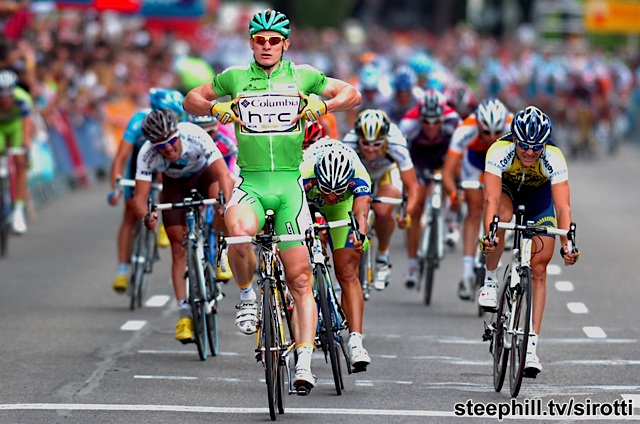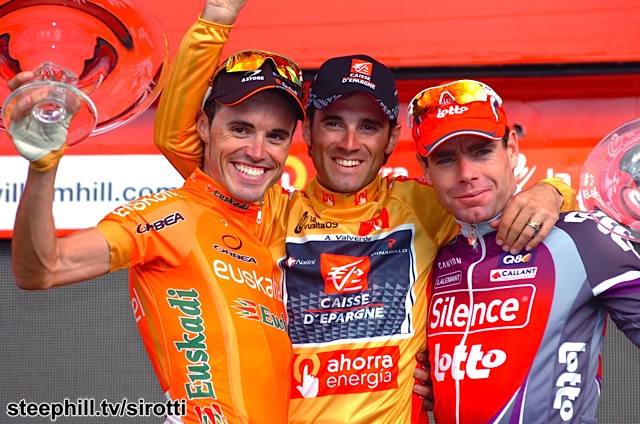
 | « steephill.tv home • |
| « Stage 20 | Return to Vuelta a Espana 2009 Live Dashboard | Stage 22 » | |||||
|
profile | map | timetable | preview | results | photos | video Stage 21: Rivas-Vaciamadrid → Madrid Post Stage AnalysisGreipel Makes It Four in Madrid 

The Vuelta a España rode into Madrid today for its traditional finale, and André Greipel won the sprint for the stage victory. It was Greipel's fourth win of this Vuelta and Columbia-HTC provided their usual armchair ride to the finish. Liquigas-Doimo gave Daniele Bennati a smooth lead-out today, but the Italian could not match Greipel's speed and finished second. Bennati leaves the Vuelta winless this year. Borut Božič of Vacansoleil, who won a stage earlier in the race, finished third in Madrid, followed by Leonardo Duque of Cofidis and Sébastien Hinault of AG2R-La Mondiale. Alejandro Valverde, meanwhile, finished safely in the bunch and has won his first ever Vuelta. As they entered the finishing circuits through central Madrid, the main field allowed Bingen Fernández of Cofidis to ride off the front and take a solo lap. Fernández is retiring at the end of this season and the lap around Madrid provided a fitting send-off for a rider who has spent so many kilometers off the front of this Vuelta. With the salute to Fernández complete, it was time to get down to racing, and immediately a break of five riders escaped the clutches of the main field. The escape included David Garcia of Xacobeo-Galicia, Rémy Di Gregorio of Français des Jeux, Manuel Vazquez of Contentpolis-Ampo, Mickael Delage of Silence-Lotto, and Jesús Rosendo Prado of Andalucia-Cajasur. Dominik Roels of Team Milram decided he wanted to join the fun, and the German bridged across, making it six riders out in front. The sprinters' teams never allowed the breakaway much space to ride, and the gap hovered around 30 seconds. With the most successful sprinter of this Vuelta in André Greipel, Columbia-HTC took the lead in the chase effort. Liquigas-Doimo, Vacansoleil, and Saxo Bank also had ambitions for their sprinters and threw their legs into the effort to keep the pace high and the break doomed. With just over a lap to go, the sprinters caught the break, though Mickael Delage of Silence-Lotto resisted until the bitter end. Into the bell lap, it was all back together and the speeds rose to screaming fast. All the sprinters' teams bunched at the front, playing for position. Into the final turns, Columbia rode on the front with Liquigas-Doimo and Saxo Bank close by. Charging up the right-hand barricades, Marco Velo of Quick Step flew up the road. Liquigas-Doimo with a solid lead-out for Daniele Bennati came up on the left-hand side, and for a time, it looked like Bennati might get his first victory of this Vuelta. Right up the middle, André Greipel took a straight shot to the line and had plenty of time to point to his sponsors and celebrate his fourth stage win. Daniele Bennati finished second, followed by Borut Božič of Vacansoleil, Leonardo Duque of Cofidis, and Sébastien Hinault of AG2R-La Mondiale. Greipel also takes home the Green Jersey of Points winner for this year's Vuelta. Greipel said he was "very happy to win the final sprint," and called it "a victory for the team." The sprinter also said that he hopes next year's Vuelta has fewer mountains, because too much climbing is "hard for the sprinters." Honest, this Greipel. A crash in the finale took last year's winner in Madrid Matti Breschel out of the sprint. Marco Velo of Quick Step got pinballed through the field and bumped Breschel hard enough to send the Dane into intimate contact with the barricades. The Saxo Bank rider proved able to finish, but was disappointed to miss the final sprint. Alejandro Valverde wins the first grand tour of his career after four times finishing in the top five of the Vuelta a España. Valverde benefitted from strong support from his Caisse d'Epargne team, who rarely left him to his own devices. He rode a strong and steady race, and though he suffered a rough moment on the steep slopes of the Sierra de la Pandera, Valverde never lost his nerve. Valverde's win has it controversial side, of course. The Spanish rider is banned from competing in Italy as a consequence of his alleged involvement in the Operation Puerto blood doping ring. Both the rider and the Spanish Federation have disputed the Italian decision, and the Sports Arbitration Court currently has several cases under review in relation to Valverde. Decisions are not expected until November at the earliest. When asked about the case in a post-stage press conference, Valverde said he wasn't thinking about it now. Samuel Sánchez finished second and will head to the World Championship road race as one of the favorites for the hilly course with its tricky descents. Cadel Evans, meanwhile, adds another grand tour podium to his collection. The Australian is not know for his luck or for his team support in the grand tours. He has never quite found the knack for convincing other riders to work with him on the road, which certainly complicates the task of winning road races. Road racing is a social game, after all. For fourth placed Ivan Basso, the time trial stages proved his undoing, as he lost significant time each time he raced the watch. His fourth place finish is likely less than he'd hoped, especially when he faces significant leadership challenges from within his Liquigas-Doimo team with Franco Pellizotti, Roman Kreuziger, and Vincenzo Nibali all riding well in the three week tours. The Liquigas-Doimo rivalries should be an intriguing subplot for next year's season. Climber Ezequiel Mosquera of Xacobeo-Galicia rounds out the top five, after missing this year's Giro d'Italia due to injury. Young Dutch climber Robert Gesink dropped to sixth after a bad crash left him with an injured knee. A rider for the future, Gesink showed a clear talent for the high mountains and will almost certainly better his sixth place finish next season. Here is the final general classification: Thanks for playing along with us here at Steephill for the last three weeks. It's been good times. Next week, watch for World Championship previews and video links. And by next week, I mean like, tomorrow or the next day. How the time flies, see you soon! ~Gav This stage preview is available in the following languages:
(We are looking for translations in ALL other languages. Please submit your translation with the stage no. and language in the subject title.) Course PreviewStage 21: Rivas Vaciamadrid – Madrid Terrain
Type: Rolling terrain in the first
part, completely flat in Madrid The Vuelta a España comes to an end with the typical flat stage around the capital of Spain. Madrid will pay a tribute to the survivors of this adventure that started in the Netherlands three weeks ago. There will be no terrible fights, it’s party day for the GC contenders. The rider in golden jersey will be celebrating his victory and sharing it with the other jerseys: red for the best climber, green for the rider with most points and white for this strange thing called combinada. Everyone will be happy today, the hard work is over and tomorrow they will be flying home. Madrid is the largest city in Spain and one of the major financial centres in Europe. It doesn’t have an ancient history like most cities in Spain, but it received a lot of immigrants from everywhere and now is very cosmopolitan and a meeting point of all the different cultures in Spain and Latin America. The theatres and museums in the day, and the concerts and night clubs at night make it one of the cities with most cultural attractions. The Prado Museum, where the riders will pass by, is possibly the best art gallery in the World. Speaking of cycling, Madrid is a relatively flat city (remember 2005 World Championships), but only 40 kilometers north bike fans can enjoy relatively difficult mountains to climb (Abantos, Navacerrada,…) In 1979, the Vuelta a España chose Madrid to be the finish point of the race, either with a time trial or the traditional circuit on La Castellana Avenue. The course starts in Rivas-Vaciamadrid, a newly created town which hosted stage twice before. It’s too close to downtown Madrid (only 15 kilometers), so we will head south to some towns (Mejorada del Campo, Arganda del Rey) that will be happy to see the last day parade. The towns itself are not interesting, and the landscape is among the driest in Europe, so the TV will likely wait until Madrid to broadcast the stage. The riders will take a big Avenue, del Mediterráneo, pass by El Retiro Park and enter the final circuit. Six kilometers trough Castellana Avenue and only two 180 degrees turns in every lap. Time for sprinters, who shouldn’t forget the slight uphill gradient the road has in the final meters to the finish line. This was one of the causes of last year’s messy sprint won by Danish Matti Breschel. The Plaza de Cibeles will be crowded to see the end of this Vuelta. If you are a soccer fan, you must know that Cibeles is the place where Real Madrid celebrates the titles won. Who to watch It’s not hard to predict that a fast rider will win in Madrid. The last 24 kilometers are completely flat with few turns, so the bunch should ride incredibly fast. The ones who dare attack must know that the sprinters’ teams won’t let them open any gap. The Vuelta usually boasts a high quality set of sprinters in the beginning of the race. Unfortunately, most of them withdraw during the race, either to prepare the Worlds or simply because they don’t want to suffer the last mountain stages. Look at the list and you’ll find that Tyler Farrar, Tom Boonen and Óscar Freire, world-famous sprinters, will not be here to contest the stage. However, there still remain very competitive riders: Triple stage winner Andreas Greipel will seek a fourth supported by the strong Team Columbia, with riders like Greg Henderson, winner in Venlo (stage 3) when he was working for his team leader. Young German Gerard Ciolek, of Milram, and Danielle Bennati of Liquigas will try to break the Columbia treno and take the very last stage victory in this Vuelta a España. And, why couldn’t a surprising Borut Bozic win again? He has proven strong enough to beat the ProTour teams. This massive sprint might be difficult to control, so you can expect a victory from a unexpected rider (remember Breschel last year). When the last rider of the bunch crosses finish line, three difficult weeks of theVuelta a España will be will be over. Say enhorabuena to the champion. Next year the Vuelta will start in Seville (my hometown), and steephill.tv will be covering the race. See you then. – Juan Bonilla — Gavia (updates to this preview will be made during the race and especially the day before the stage with current analysis)<-->
|
| |||||